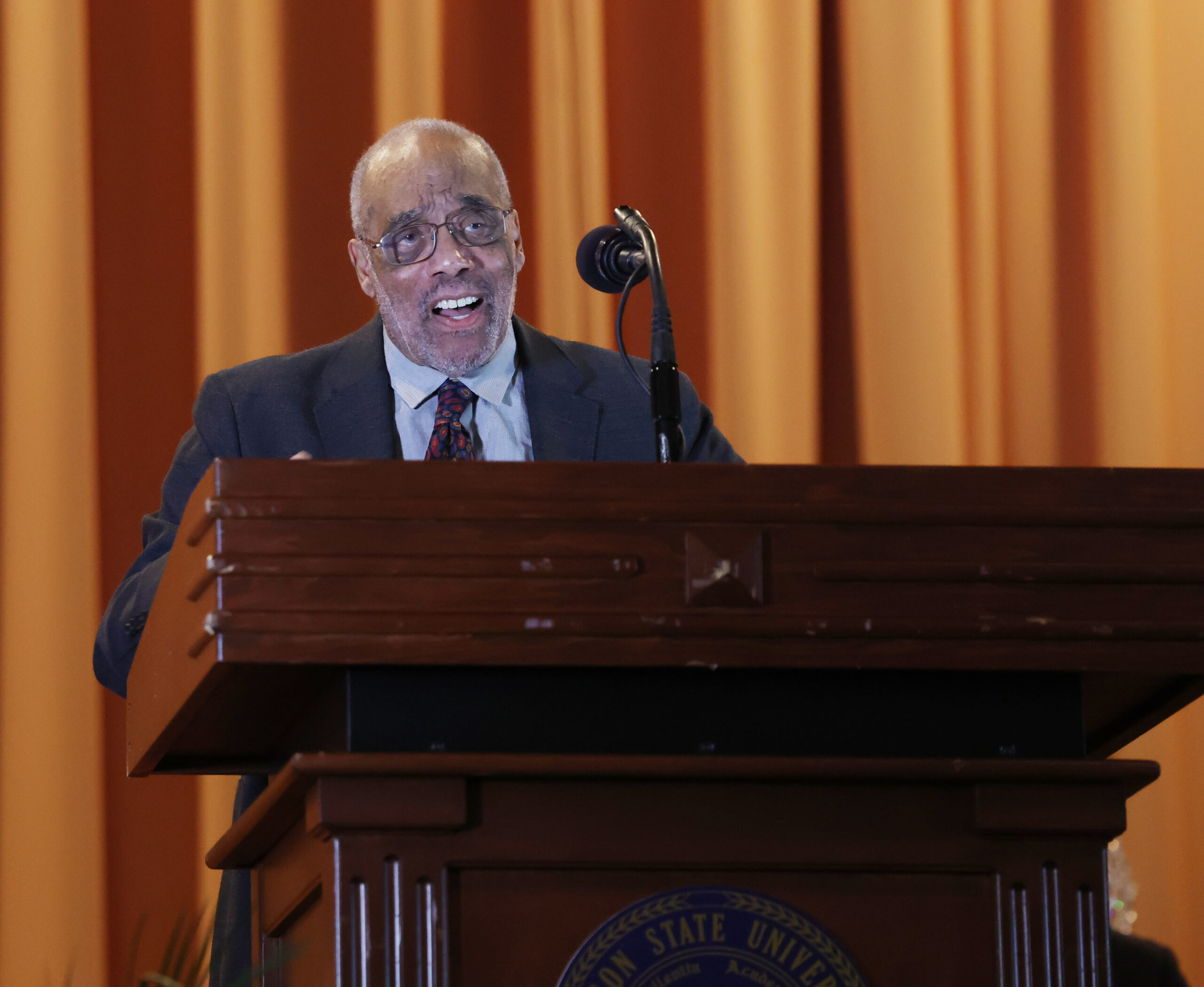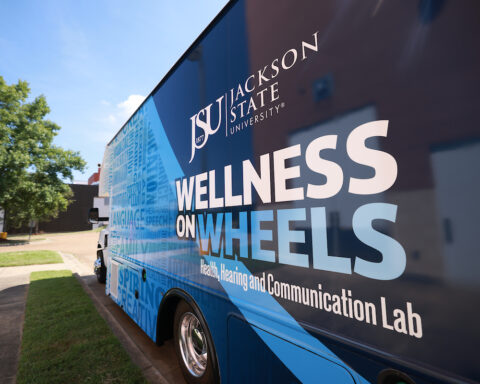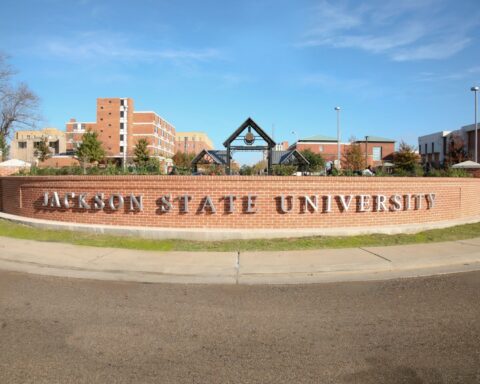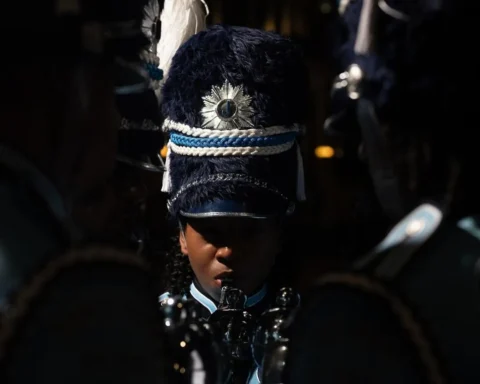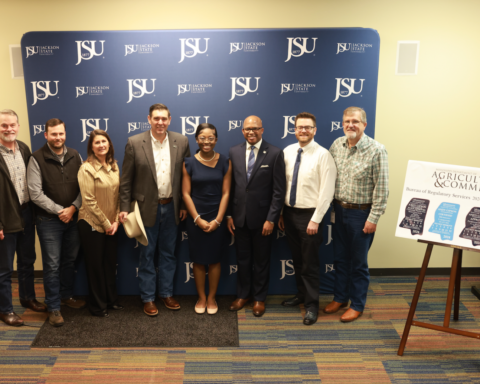By William H. Kelly, III
Jackson State University held its 55th Annual Dr. Martin Luther King Jr. Birthday Convocation at the M.W. Stringer Grand Lodge on Friday. Community leaders, guests, politicians, and JSU students, faculty and staff entered to the sound of Dr. King’s “I Have A Dream” speech echoing throughout the auditorium while videos and images from some of King’s most iconic moments were displayed on projectors at the front of the room.
“Nearly 55 years have passed since the ultimate death of Dr. Martin Luther King, Jr., yet his words, his legacy, and the movement are just as meaningful and prevalent today as they were during the peak of the civil rights movement,” said Jennifer Young Wallace, Ph.D., JSU associate professor of educational administration and advisory board secretary of the Margaret Walker Center Advisory Council.
During his welcome, JSU President Thomas K. Hudson, J.D., reminded the audience of the significant role that the M.W. Stringer Grand Lodge played during the Civil Rights Movement, reaffirming its selection as the venue for this year’s the MLK celebration.
“These are indeed hallowed grounds in which we stand. A safe space where civil rights leaders met and organized, where Dr. Martin Luther King stood and spoke, and where our very own Medgar Evers was memorialized,” Hudson said. “It is appropriate that we honor these spaces, not as a museum frozen in time, but as living, breathing monuments of history.”
Hudson encouraged members of the audience to duplicate the examples that King established in how he “provoked action.” He further reminded listeners that as a community we must “stand on our character, be unyielding in truth, and unbreakable in spirit” to cultivate the next generation of students who are the future leaders and inspirers of the nation and the world.
Mayor Chokwe Antar Lumumba offered greetings on behalf of the City of Jackson. He emphasized how today’s social justice issues aren’t so distant from what the citizens and leaders of the civil rights movement experienced 50 years ago.
“When I think, today, about the issues of people not having security of things like water, which is certainly a subject that we broach every day. When certain parts of our city have the security of it, while other parts of our city don’t, that seems to remind me of things like ‘separate but equal,’” said Lumumba, who added that although “this can become somewhat of a perfunctory exercise…it is important that we understand, as it has been said previously, that those who do not know their history are bound to repeat it.”
The convocation keynote speaker, activist-journalist Charlie Cobb, reflected on his time and role during the civil rights movement, and ultimately his time in Mississippi. Cobb was born in Washington, D.C., but credits his “birth” to the Mississippi Delta.
“I want to spend the bulk of my time here elaborating on the movement. In particular, the organizing tradition of the movement that was so deeply rooted in this state,” said Cobb. “In the minds of many people, the movement is thought of as mass protests in public spaces led by charismatic leaders. That is only partly true.”
He added, “returning to this state, I always feel I’ve come back home. In many ways who I am today begins in Mississippi,” said Cobb.
Cobb recalled that while traveling to Houston, Texas for a civil rights conference, his bus stopped in Jackson, Mississippi. There he encountered two strong-minded students from Tougaloo College who challenged his motives while standing in a historic state such as Mississippi. During this time in Cobb’s youth, the murder of Emmit Till had transpired along with numerous protests and sit-ins that Cobb said was only “partly” the movement.
“‘We’re doing stuff in Mississippi. So, if you want to do something then stay with us,’” said one of the students to Cobb. He went on to spend the next five years in Mississippi.
Throughout his speech, Cobb shared the stories and words of many activists, known and unknown, who experienced violent racism and segregation firsthand. In one particular story, Cobb was arrested while a group of citizens tried to register to vote. He reminded the audience that what we’re seeing today “is definitely not new.”
“Night riders came through and shot up the Black community, and I was arrested for the shooting by the mayor, who said that I had done it to gain publicity for a failing movement.”
As Cobb closed, he left the audience with these words.
“In the United States today, with civil rights and civil liberties so well known, the most important lesson in the civil rights movement is still relevant. You have to make a demand for the kind of society in which you want to live, especially if you want to live in a free society. As we used to say, ‘freedom is not free,’” Cobb said. “What we learned in the passage of time from Martin Luther King’s emergence to the now Black Lives Matter is that the emergence of ordinary people, leaders, and spokespeople force change. People who keep their eyes on the prize, and today this need is more urgent than it has ever been, and perhaps more possible.”
Robert Luckett, Ph.D., director of the Margaret Walker Center at Jackson State University, addressed the audience following Cobb.
“I often get asked, ‘why isn’t there a movement like there was in the 1960s,’ and I say to people all the time ‘you’re just not paying attention,’” Luckett said, turning to Cobb. “Thank you for reminding us that the movement continues today.”

